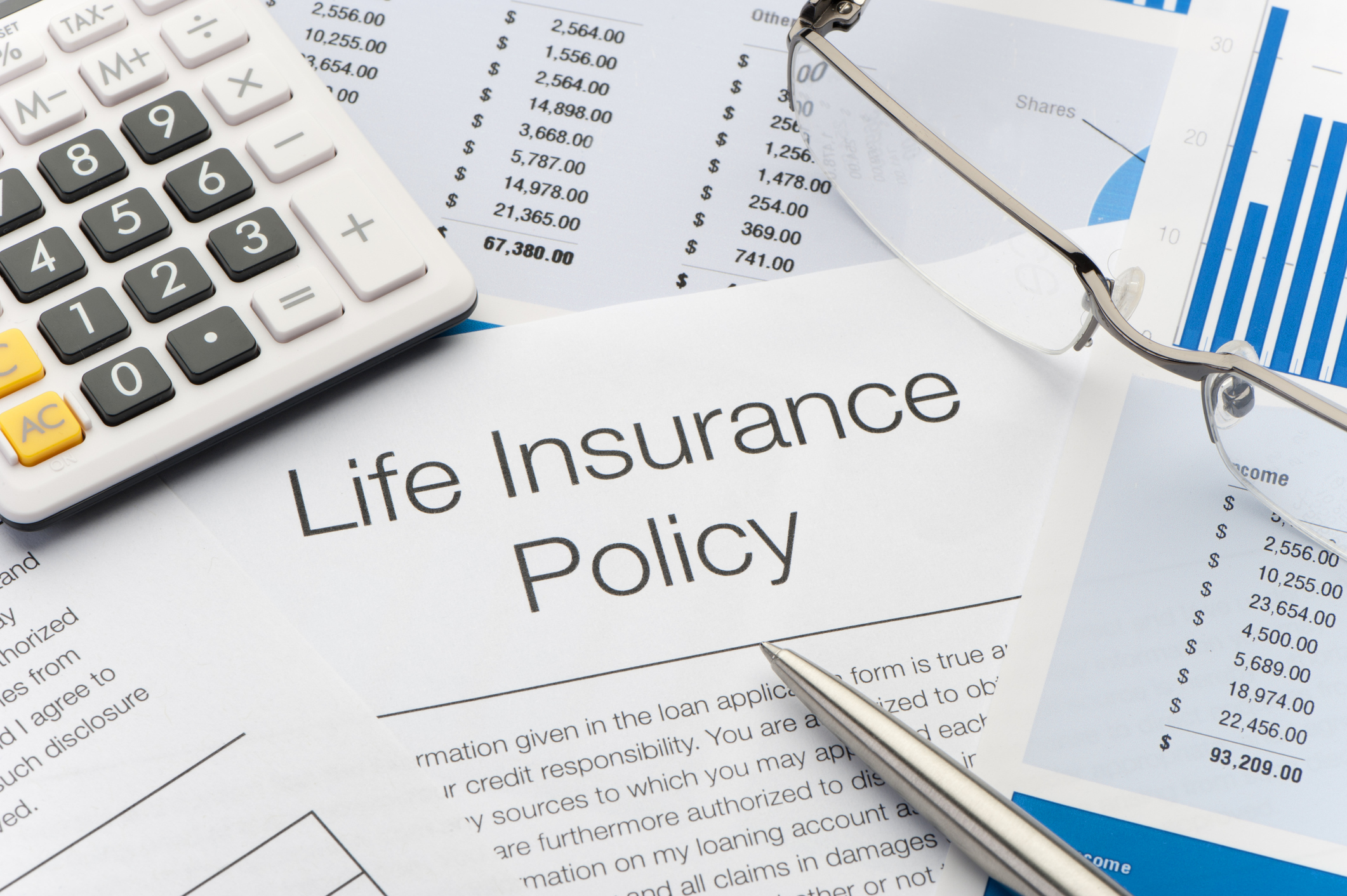What Is Term Life Insurance?
Term life insurance offers affordable coverage for a set period. Here's how it works and when it makes sense to buy a policy.

Profit and prosper with the best of Kiplinger's advice on investing, taxes, retirement, personal finance and much more. Delivered daily. Enter your email in the box and click Sign Me Up.
You are now subscribed
Your newsletter sign-up was successful
Want to add more newsletters?

Delivered daily
Kiplinger Today
Profit and prosper with the best of Kiplinger's advice on investing, taxes, retirement, personal finance and much more delivered daily. Smart money moves start here.

Sent five days a week
Kiplinger A Step Ahead
Get practical help to make better financial decisions in your everyday life, from spending to savings on top deals.

Delivered daily
Kiplinger Closing Bell
Get today's biggest financial and investing headlines delivered to your inbox every day the U.S. stock market is open.

Sent twice a week
Kiplinger Adviser Intel
Financial pros across the country share best practices and fresh tactics to preserve and grow your wealth.

Delivered weekly
Kiplinger Tax Tips
Trim your federal and state tax bills with practical tax-planning and tax-cutting strategies.

Sent twice a week
Kiplinger Retirement Tips
Your twice-a-week guide to planning and enjoying a financially secure and richly rewarding retirement

Sent bimonthly.
Kiplinger Adviser Angle
Insights for advisers, wealth managers and other financial professionals.

Sent twice a week
Kiplinger Investing Weekly
Your twice-a-week roundup of promising stocks, funds, companies and industries you should consider, ones you should avoid, and why.

Sent weekly for six weeks
Kiplinger Invest for Retirement
Your step-by-step six-part series on how to invest for retirement, from devising a successful strategy to exactly which investments to choose.

A life insurance policy can provide your family with financial support after you die. Life insurance can help your beneficiaries with funeral costs, mortgage payments and other expenses.
Term life insurance, the most common type of life insurance policy, also tends to be one of the least expensive options.
If you want peace of mind knowing your family will have financial support if you pass, a term life policy is one potential solution, but it's important to make sure you understand how the policy works and whether it's the right move for your family.
From just $107.88 $24.99 for Kiplinger Personal Finance
Become a smarter, better informed investor. Subscribe from just $107.88 $24.99, plus get up to 4 Special Issues

Sign up for Kiplinger’s Free Newsletters
Profit and prosper with the best of expert advice on investing, taxes, retirement, personal finance and more - straight to your e-mail.
Profit and prosper with the best of expert advice - straight to your e-mail.
What is term life insurance?
Term life insurance provides coverage during a specific period of time, such as 10, 20 or 30 years. If you pass away during that term and you're up to date on your policy payments, your insurance will pay a death benefit to your beneficiaries.
If you pass away outside of that term and you haven't renewed or extended your coverage, your beneficiaries won't receive a benefit.
How does term life insurance work?
When you buy a term life insurance policy, you're able to choose your term length. Most terms are between 10 and 30 years, but you'll usually pay higher premiums for a longer term.
You can also choose your death benefit amount. Determining how much life insurance you need is a personal choice and you'll need to consider factors like any savings your family has and the types of expenses your beneficiaries might face after your death.
Unlike other types of life insurance, like whole life insurance, term life insurance doesn't have a cash value component, so you're not able to borrow from or withdraw your benefit.
If you die during the policy term, your life insurance beneficiaries will receive a benefit. They can use that benefit for expenses, including funeral costs, daily living expenses, mortgage payments, future retirement needs, education expenses and more.
You can choose one or multiple beneficiaries, and while it's common for them to be family, beneficiaries can also be friends, a trust or a charity.
If you're still alive at the end of the policy term, your policy will end without a benefit being paid out. In some cases, you may have the option to convert the term policy into a permanent policy at the term end.
Other policies may give you the option to renew the policy, but you'll usually have to complete a medical exam and will pay higher premiums on the new renewed policy.
Alternatively, some life insurance policies include a return of premium feature that means you can have some or all of your premiums returned to you if you outlive the term. These policies tend to have much more expensive premiums than policies that don't include a return of premium feature.
What types of term life insurance exist?

There are several different types of term life insurance policies. All of these policies provide a specified death benefit if you die during the policy term, but there are some key differences between how they work.
- Level term: Level term policies, which are also called level premium policies, are the most common type of term life insurance. With these policies, your premium remains the same during the entire term, and your death benefit is a fixed amount.
- Decreasing term: Decreasing term policies feature a death benefit that gradually declines each year, but the premium stays the same during the entire policy's term.
- Increasing term: An increasing term policy features a benefit that increases over the policy's term, though the premium stays the same.
- Yearly renewable term: Yearly renewable term policies feature a one-year term, and you can renew the policy each year. However, the premiums will increase as you age, so these policies can quickly get expensive.
How much does term life insurance cost?
Since term life insurance provides a benefit only during a limited amount of time, it tends to be one of the least expensive types of life insurance. This type of insurance can be ideal if you're looking for coverage at a low cost.
Many factors will affect your term life insurance policy cost, including the amount of coverage and duration of the term that you choose. Your gender plays a role, and males will have slightly higher premiums than females.
Your health also affects your rates. When you buy a policy, you'll need to answer some questions about your health, and you may be required to complete a medical exam.
If you're older, you'll pay higher premiums, and health issues, unhealthy habits like nicotine and tobacco use, medications you're taking and even your family history can affect your rates.
When does it make sense to choose term life insurance?
Term life insurance has many advantages, but it also has some drawbacks.
Choosing a term life insurance policy makes sense in several situations:
- You need the most affordable coverage. A term life policy is usually more affordable than any sort of permanent life insurance, especially if you're young and healthy.
- You need temporary coverage. If your family is paying off debt or you want to have life insurance coverage until your children are grown, a 20-year term policy can give you that temporary coverage until your family is more financially stable.
- You can't afford permanent life insurance yet. A term life insurance policy can be a more affordable way to start your coverage, like when you're early on in your career and will have a higher income when the policy ends. If you choose a policy that's convertible, you can convert it into a permanent policy at the end of the term.
What other types of life insurance are available?
There are many advantages to term life insurance, but it's a temporary policy, and you need to make sure that it's right for your budget and goals.
There are several common types of permanent life insurance policies available, too.
- Whole life insurance policies provide coverage during your entire life, as long as you make your payments. These types of policies build cash value as you pay into them, and you can borrow against or withdraw from that cash value if needed, such as if you need to make an emergency home repair.
- Universal life insurance works similarly to a whole life policy, but it offers a bit more flexibility. With a universal life insurance policy, you can make adjustments to your premiums and death benefit.
- Variable life insurance features an investment component, so you can invest the policy's cash value in stocks and bonds. That investment component can help the benefit to grow, but if your investments don't do well, you could lose money.
The premiums for these types of policies vary, so it's helpful to get a quote for the type of policies you're interested in.
Think carefully about your personal financial situation, your health, your family's expenses and the type of financial support you want a policy to provide when deciding which option is best for you.
Get more insurance tips and other personal finance insights straight to your inbox. Subscribe to our daily newsletter, A Step Ahead.
Related Content
Profit and prosper with the best of Kiplinger's advice on investing, taxes, retirement, personal finance and much more. Delivered daily. Enter your email in the box and click Sign Me Up.

Paige Cerulli is a freelance journalist and content writer with more than 15 years of experience. She specializes in personal finance, health, and commerce content. Paige majored in English and music performance at Westfield State University and has received numerous awards for her creative nonfiction. Her work has appeared in The U.S. News & World Report, USA Today, GOBankingRates, Top Ten Reviews, TIME Stamped Shopping and more. In her spare time, Paige enjoys horseback riding, photography and playing the flute. Connect with her on LinkedIn.
-
 Quiz: Do You Know How to Avoid the "Medigap Trap?"
Quiz: Do You Know How to Avoid the "Medigap Trap?"Quiz Test your basic knowledge of the "Medigap Trap" in our quick quiz.
-
 5 Top Tax-Efficient Mutual Funds for Smarter Investing
5 Top Tax-Efficient Mutual Funds for Smarter InvestingMutual funds are many things, but "tax-friendly" usually isn't one of them. These are the exceptions.
-
 AI Sparks Existential Crisis for Software Stocks
AI Sparks Existential Crisis for Software StocksThe Kiplinger Letter Fears that SaaS subscription software could be rendered obsolete by artificial intelligence make investors jittery.
-
 One of the Most Powerful Wealth-Building Moves a Woman Can Make: A Midcareer Pivot
One of the Most Powerful Wealth-Building Moves a Woman Can Make: A Midcareer PivotIf it feels like you can't sustain what you're doing for the next 20 years, it's time for an honest look at what's draining you and what energizes you.
-
 I'm a Wealth Adviser Obsessed With Mahjong: Here Are 8 Ways It Can Teach Us How to Manage Our Money
I'm a Wealth Adviser Obsessed With Mahjong: Here Are 8 Ways It Can Teach Us How to Manage Our MoneyThis increasingly popular Chinese game can teach us not only how to help manage our money but also how important it is to connect with other people.
-
 Looking for a Financial Book That Won't Put Your Young Adult to Sleep? This One Makes 'Cents'
Looking for a Financial Book That Won't Put Your Young Adult to Sleep? This One Makes 'Cents'"Wealth Your Way" by Cosmo DeStefano offers a highly accessible guide for young adults and their parents on building wealth through simple, consistent habits.
-
 My Spouse and I Are Saving Money for a Down Payment on a House. Which Savings Account is the Best Way to Reach Our Goal?
My Spouse and I Are Saving Money for a Down Payment on a House. Which Savings Account is the Best Way to Reach Our Goal?Learn how timing matters when it comes to choosing the right account.
-
 We're 78 and Want to Use Our 2026 RMD to Treat Our Kids and Grandkids to a Vacation. How Should We Approach This?
We're 78 and Want to Use Our 2026 RMD to Treat Our Kids and Grandkids to a Vacation. How Should We Approach This?An extended family vacation can be a fun and bonding experience if planned well. Here are tips from travel experts.
-
 My First $1 Million: Retired From Real Estate, 75, San Francisco
My First $1 Million: Retired From Real Estate, 75, San FranciscoEver wonder how someone who's made a million dollars or more did it? Kiplinger's My First $1 Million series uncovers the answers.
-
 To Love, Honor and Make Financial Decisions as Equal Partners
To Love, Honor and Make Financial Decisions as Equal PartnersEnsuring both partners are engaged in financial decisions isn't just about fairness — it's a risk-management strategy that protects against costly crises.
-
 Top 5 Career Lessons From the 2026 Winter Olympics (So Far)
Top 5 Career Lessons From the 2026 Winter Olympics (So Far)Five lessons to learn from the 2026 Winter Olympics for your career and finances.